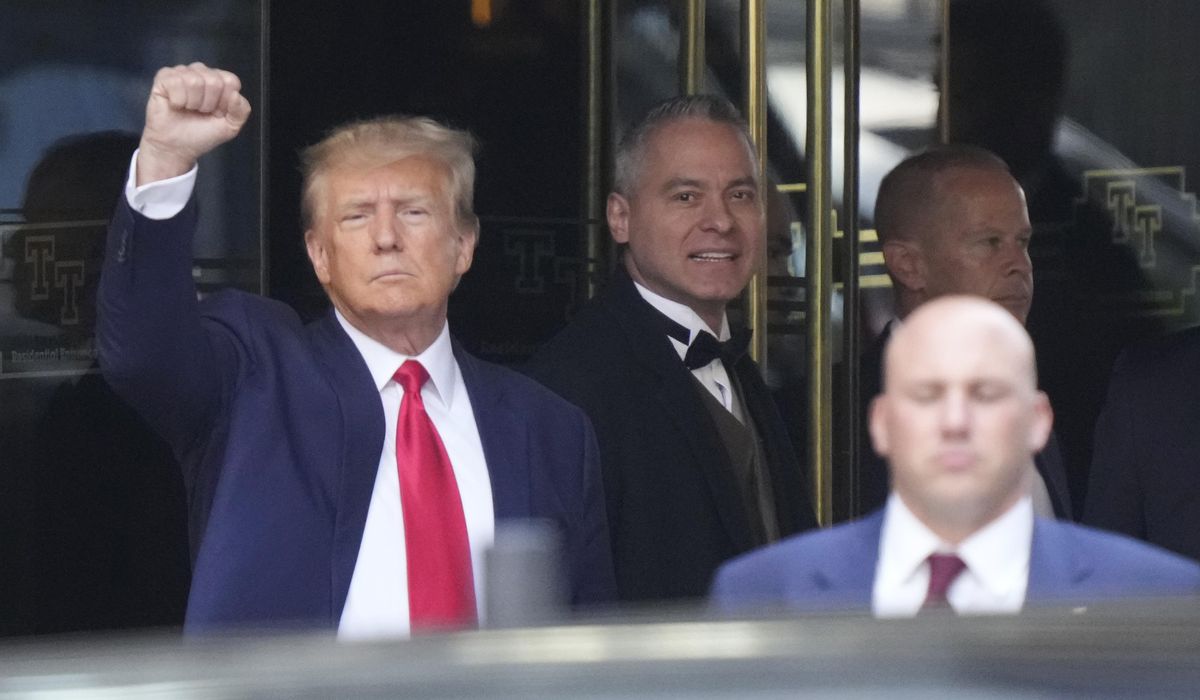


Former President Donald Trump will soon get a sense of whether he still holds sway over evangelical voters who typically play a decisive role in selecting Republican presidential nominees.
Complicating his relationship with the religious right is new headlines reminding voters about allegations of extramarital affairs with adult film actress Stormy Daniels and Playboy model Karen McDougal, as well as an unsubstantiated story about Mr. Trump having a love child with an unnamed mistress.
Mr. Trump is slated to deliver a remote address to the Iowa Faith and Freedom Coalition’s “Road to Majority” 2024 spring kickoff this weekend in Clive, Iowa. Former Vice President Mike Pence, Sen. Tim Scott of South Carolina, and former Arkansas Gov. Asa Hutchinson are among the other featured speakers that plan to attend in person.
Republican Iowa state Sen. Jeff Taylor said voters who already had qualms with Mr. Trump might glom onto the hush-money story, but said most Christian conservatives are more likely to judge the former president on his four years in office — and his chance of winning back the White House.
“It is not really new information that he has a checkered personal history,” Mr. Taylor said. “I think most Republicans who are looking at this discount it because they say this is just one more politically motivated hit job on Trump.”
Mr. Trump was charged with falsifying business records to conceal the hush-money payments in 2016:
• $130,000 paid to Ms. Daniels to keep quiet about her allegation that she and Mr. Trump had a sexual romp in 2006;
• $150,000 paid to Ms. McDougal for her silence about an alleged sexual relationship with Mr. Trump in 2006 and 2007;
• $30,000 payoff went to a former Trump Tower doorman who was peddling a story that Mr. Trump had a child out of wedlock.
Mr. Trump has denied all the allegations and any wrongdoing.
His rivals have generally sided with him in denouncing as a political ploy the criminal charges brought by Manhattan District Attorney Alvin Bragg. Still, that won’t stop them from raising questions about Mr. Trump’s commitment to the Christian right.
After the GOP suffered disappointing results in last year’s midterm congressional elections, Mr. Trump said the party had botched abortion politics. Others, though, blamed his unproved claims about the 2020 election and his support for untested candidates as reasons for the GOP’s struggles.
Steve Scheffler, president of the Iowa Faith and Freedom Coalition, told The Washington Times Mr. Trump had decent prospects with evangelical voters, but that doesn’t mean much right now.
“If I was betting man, today, I think [Mr. Trump] has the upper hand in Iowa, but it is yet to be determined whether he will win the caucuses,” Mr. Scheffler said. “In the world of politics, everything can change in 24 hours.”
The Real Clear Politics average of polls shows Mr. Trump holds close to a 30-point over his closest competitor, Gov. Ron DeSantis of Florida.
Mr. DeSantis, who recently signed a six-week abortion ban into law, is expected to enter the race as soon as next month. He has been testing a message centered on the idea that Florida provides a conservative blueprint for the rest of the nation.
Mr. Scott, meanwhile, is casting himself as an uniter, not a divider. Mr. Pence is centering his message on being a commonsense conservative. Nikki Haley, a former ambassador to the U.N., has stressed that she has never lost an election.
For his part, Mr. Trump has reminded social and religious conservatives that he followed through on a slew of campaign promises, overcoming initial doubts about his commitment to their causes.
“Trump is going to get a very fair hearing from voters of faith because of the promises he made and kept on key moral public policy concerns that animate and energize evangelical voters: life, religious freedom, support for Israel, and judicial nominations,” said Ralph Reed, chairman of the Faith and Freedom Coalition.
But he said other candidates also will get a fair shake from evangelical voters. “This is going to be a competitive primary,” he said.
Iowa political insiders also say the state’s conservatives, especially Christian conservatives, still have a level of discomfort with Mr. Trump’s conduct and personality. Those voters are ready to explore alternatives to Mr. Trump.
“People who were never enthused about Trump, who reluctantly went along with him — they are probably eager to find someone new because they were never sold on Trump,” said Mr. Taylor, the state senator.
Mr. Trump’s unlikely alliance with Christian conservatives dumbfounds his critics and presents his 2024 rivals with the challenge of convincing voters it is time to move on from the thrice-married former reality television star.
Iowa, which leads off the GOP’s primary calendar with its caucuses, is considered a key test of evangelical strength.
Mr. Trump placed second in the 2016 GOP caucuses, trailing Sen. Ted Cruz of Texas.
But Mr. Trump’s showing in the 2016 caucuses was good enough to erase some doubts about his tabloid-style life and his evolution on social issues from an abortion-rights supporter to a pro-life champion.
Mr. Trump solidified that support during the general election by releasing a list of potential Supreme Court nominees that were cut from a conservative cloth, tapping Mr. Pence as his running mate, and regularly surrounding himself with members of his immediate family.
Christian voters, over time, warmed to Mr. Trump.
As president, Mr. Trump promoted religious liberty, moved the U.S. Embassy in Israel from Tel Aviv to Jerusalem, and nominated conservative justices to the Supreme Court, which last year overturned the 1973 Roe v. Wade decision that legalized abortion nationwide.
“It‘s going to be a primary battle for the ages, with no holds barred, and it will be brutal before it’s over,” Mr. Reed said.
• Seth McLaughlin can be reached at smclaughlin@washingtontimes.com.
